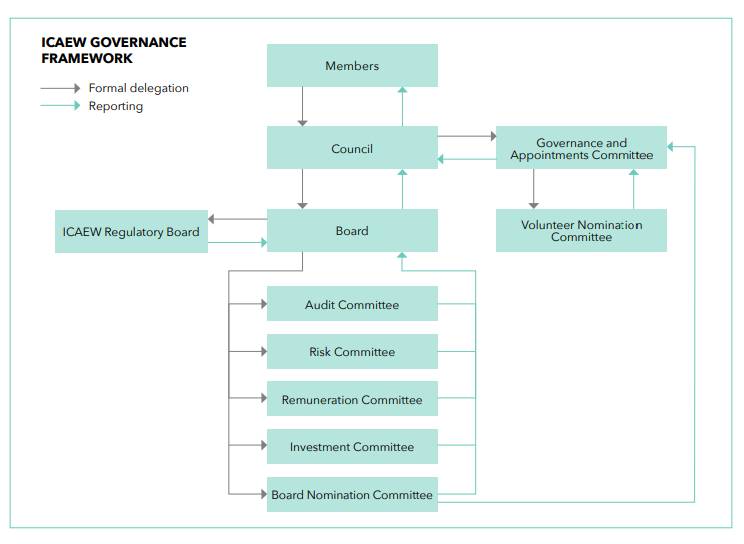Learn about how ICAEW is governed, our Royal Charter and our constitutional arrangements.
How we’re governed
Council is the governing body of ICAEW under the Royal Charter and sets our strategic direction. Council is supported by a number of committees and a Board.
This diagram illustrates the governance structure of ICAEW:

Royal Charter and Bye-laws
All that ICAEW does and is responsible for is defined by its Royal Charter. It was awarded in 1880 and substantially amended in 1948. The Explanatory notes give more information about ICAEW's incorporation by Royal Charter, the granting of the Supplemental Charter, amendments made to the Supplemental Charter since 1957, and ICAEW's powers to make new bye-laws and to rescind or vary existing bye-laws.
Office Holders
The President, Deputy President and Vice President (the ‘Office Holders’) are senior members of ICAEW, elected by their Council member peers into this role. They are leading ambassadors for ICAEW, focusing on relationships with members and promoting the work of ICAEW to members, students, and other professional bodies.





-
Council
Council leads on ICAEW Strategy and oversees its efficient and effective implementation. It delegates responsibility for leadership, management and operations of ICAEW to ICAEW Board, except for matters expressly reserved to Council.
Council is made up of about 95 members reflecting our UK and International membership and the main sectors and interests of the membership.
-
Governance and Appointments Committee
GAC keeps ICAEW's governance under active review to ensure that it remains fit for purpose, with a focus on future needs. Working with the Board Nomination Committee, it also oversees appointments and succession planning for ICAEW Board, including the Executive Board members, and Department Boards and their committees.
GAC membership
- David Matthews - Chair
- Dr Matthew Stroh
- Malcolm Bacchus
- Derek Blair
- Caroline Smale
- Mark Rhys
- Peter Wyman
- Alan Vallance
- Vicky Andrew
- Kathryn Britten
- Samantha Tymms
- Belinda Phipps
-
Volunteer Nomination Committee
VNC leads on the nominations for committee membership of the Departmental Boards and their committees including any advisory groups, boards or committees for communities or local networks, and any ICAEW appointments or nominations to external bodies. It is a committee of GAC.
VNC membership
- Julia Penny (Chair)
- Malcolm Bacchus
- Derek Blair
- Alan Vallance
- Andrew Mead
- Andy Batty
- Samantha Tymms
-
Active Member guidance
This provides information and guidance to ICAEW Board Members, Council Members and members of any ICAEW committee, board or advisory group (whether remunerated or not).